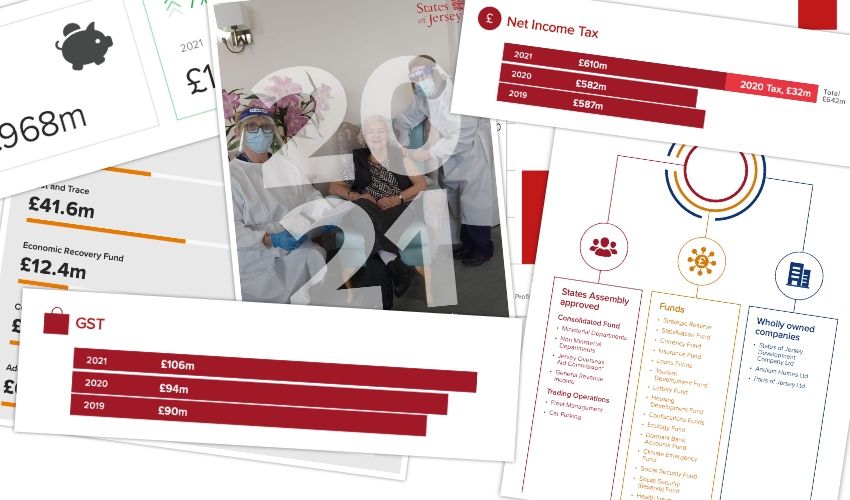


Public coffers are in "better than expected" shape after the Government spent less on covid than planned and rising stamp duty and tax revenue, coupled with a £40m windfall from JT, helped boost income.
Today, the Government has published its annual accounts for last year. Stripping out the performance of publicly owned bodies like Andium, it finished 2021 with a £59m surplus.
With fuel and food prices rising globally, the Government has ruled out duty cuts and GST exemptions, but did announce last week a £20-a-month boost for islanders receiving benefits.
Net income from general revenue in 2021 increased by £146m, including £72m of tax receipts and £30m of duty, including stamp duty, fuelled by Jersey’s blistering housing market.
In total, stamp duty netted the Government £62m in 2021, compared to £37m in 2020, driven by rising house prices and volume of transactions.
The cost of the pandemic response, at £109m last year, was also £81m less than 2020, meaning the total cost for the two years was just shy of £300m but still below forecast.
The Government therefore did not lean on its ‘revolving credit facility’ overdraft as much as it first anticipated.
Overall, revenue for the ‘States of Jersey Group’, which includes income from investments and wholly owned companies such as Andium and JT, was £1.4 billion - £110m more than 2020.
That included £750m in tax revenues (up 11%, and 52% of the total), £241m in social security contributions (up 1%, and 17% of the total) and £204m from arms-length bodies (up 2%, and 14% of the total).

Pictured: How stamp duty income rose in 2021.
Investment income only brought in £74m but increased by £29m on 2020, representing a 63% rise. This was primarily due to a £40m Government windfall due to JT selling its ‘Internet of Things’ division for £200m.
The Strategic Reserve ‘rainy day fund’ grew by 7% during the year and ended 2021 totalling more than £1 billion.
When it came to spending, Government expenditure was £1.53 billion, just down on 2020’s £1.56 billion of outgoings.
The largest chunk of money in 2021 went on paying the wages of the Government’s 7,570 members of staff. Headcount grew by 424 people last year and has grown by 1,177 over the four years of this Council of Ministers.
£483m went on staff costs (up 5%, making 32% of the total) while £477m was spent on benefit payments, a 14% fall with fewer people taking co-funded payroll support.
The Government spent £258m on capital projects in 2021, £85m less than 2020 when work dried up for obvious reasons.
£52.2m was spent on the yet-to-be-approved new hospital and £15.3m went to the ‘ITS’ technology upgrade, whose first phase was due to be completed this month but has now been pushed back to the end of the year.
Andium spent £83m on land acquisition and building, Jersey Development Company spent £32m, including £25.5m on the L’Horizon flats and Ports spent £13m, including £5.3m on a new tug.
Focusing just on States Assembly-approved spending, without the arms-length organisations, the Government spent £888m in 2021 - £31m less that 2020 – with the biggest spending department being Health at £228m, £13m more than the previous year.
Education was next at £157m, £8m more than 2020.
When it comes to saving money, the Government set itself a target of saving £120m over 2020-24.

Pictured: Treasury Minister Susie Pinel: "We were prudent in the face of the on-going uncertainties".
Last year, the savings target was £60m, which included carry-overs from 2020. Of that, £35.5m needed to be delivered on a recurring basis, so not just a one-off saving. £15.5m of that was carried over from the previous year.
During 2021, only £32.2m of savings, or ‘efficiencies’ in Government-speak, were delivered: £30.7m on a recurring basis and £1.5m on a one-off basis. This means that £4.8m has been added to the 2022 target.
Treasury Minister Susie Pinel said: “In presenting these accounts, during a second year that was dominated by covid, it is pleasing that we ended 2021 in a better financial position than anyone expected.
“We were prudent in the face of the on-going uncertainties created by covid and were fortunate that its impact was less than in 2020. While borrowing will still be needed to fulfil all of our commitments, we ended 2021 with a strong balance sheet and we have a good platform to build on for the years to come.”
Treasurer Richard Bell added that the accounts reflected the level of support given to individuals and businesses over the pandemic, which had kept the economy’s head above water, as well as the resilience of the finance industry, which had quickly been able to adjust to working from home.
Follow Express for more analysis on the Government's 2021 Annual Report and Accounts...
Covid leaves Gov nearly £300m in the red (2020 Accounts)
Gov quietly publishes accounts (2019 Accounts)
£7m deficit... and headed for far more (2018 Accounts)
Government accounts show £300m surplus – but don't get used to it (2017 Accounts)
Comments
Comments on this story express the views of the commentator only, not Bailiwick Publishing. We are unable to guarantee the accuracy of any of those comments.